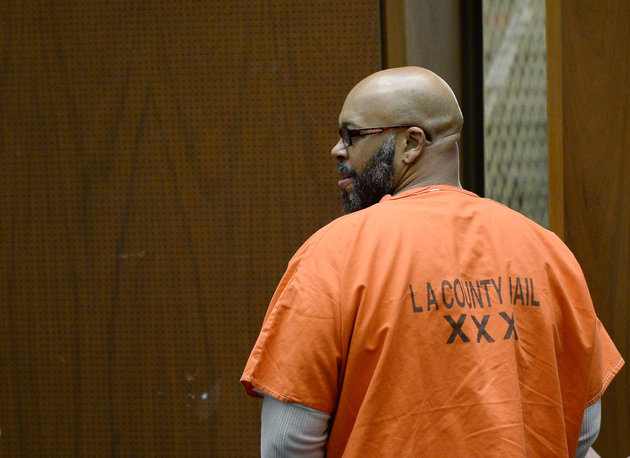Suge Knight’s Court Troubles Intertwines with Straight Outta Compton!!!
If you haven’t seen Straight Outta Compton then you’re truly missing out on one of the MUST SEE movies of 2015.
With that said an interesting fact has been brought to CelebNMusic247.com’s attention and that is Suge Knight’s Court Troubles Intertwines with Straight Outta Compton.
Marion “Suge” Knight isn’t a major character in the N.W.A biopic Straight Outta Compton, showing hip hop fans the truth behind the stories told.
Suge’s presence looms large over the film, from scenes of violence to his recent encounter on the promo set of Straight Outta Compton that has put the former rap music mogul back in the spotlight with his court case for the death of Terry Carter.
The 6’4″ former college football player had a mystique even before filming started, and the murder case filed against him over a fatal parking lot confrontation, as well as a related civil case have only increased attention on the Death Row Records co-founder.
CelebNMusic247.com has this report via The Huffington Post:
Knight, who has pleaded not guilty, remains jailed on $10 million bail while awaiting trial on charges filed after he ran over two men outside a Compton burger stand in late January.
The case and “Straight Outta Compton,” which opens Friday, have become intertwined, in large part because the film’s technical adviser, Cle “Bone” Sloan, attacked Knight moments before the ex-mogul ran him over with his pickup truck. During Knight’s getaway, he struck and killed Terry Carter, a Compton businessman who was trying to negotiate peace between Knight and rapper-producer Dr. Dre, according to his family’s attorney.
Carter wasn’t working on the film, but Sloan’s job was to help attain the gritty feel of the movie’s late 1980s and early 1990s settings. Sloan brokered deals with gangs, hiring some of their members, just so “Straight Outta Compton” could shoot in certain areas of Compton and adjacent Los Angeles.
He has proven to be a difficult witness, refusing to identify Knight in court as the man who ran over both his legs. The altercation occurred after Knight showed up at a staging area for a promotional video shoot involving N.W.A members Dr. Dre and Ice Cube. Both Dre and Sloan have had tensions with Knight for years.
Carter’s family has sued Dre, Cube and Universal Pictures, claiming they should have known that portraying Knight in the film would lead to trouble.
“While we have only heard innuendo about Mr. Knight’s depiction, if it is as prominent as we are led to believe, it creates a real difficulty for the defendants in this lawsuit,” the family’s attorney Carl Douglas said in an interview this week. “They knew or they should have known that there would be some pushback from Mr. Knight.”
Universal Pictures has not yet responded to the lawsuit, and declined comment about Knight’s portrayal in the film.
“Straight Outta Compton” has received mostly positive reviews and has been bolstered by a marketing campaign that included Dre’s first new album in 15 years, titled “Compton.”
Douglas said while the movie is a source of pain for Carter’s family, they still want it to succeed.
[rpi]
“We are hopeful that the movie is seen by millions because that will simply help to remind the public that while it is good to celebrate the movie and the group that it depicts, the backstory of the untimely death of an innocent man cannot go undisclosed,” Douglas said.
Knight’s attorney, Thomas Mesereau, said he was focused on Knight’s criminal case, not the film. He has said Knight was fleeing armed attackers when he struck Sloan and Carter.
“I have not seen the movie; however criminal cases are won in the courtroom and not the movie theaters,” Mesereau said. “We expect full exoneration for Suge Knight.”
Dueling portraits of Knight have been presented in court, with his attorneys citing his ties to Compton and his philanthropy in an unsuccessful bid to lower his bail. A prosecutor has portrayed Knight, a convicted felon, as having a history of witness intimidation.
Knight, 50, is depicted in “Straight Outta Compton” as a savvy businessman, but also a violent thug who pistol whips a man over a parking space and oversees the beating of N.W.A member Easy-E to try to get Dre released from a recording contract.
In one scene in which Knight encourages Dre to let him have a lawyer review the contract, actor R. Marcos Taylor is shot from the ground up, his large frame seemingly filling a hospital hallway where the men meet. By the film’s final act, Taylor’s character is flanked by henchmen dressed in red, the color of the Bloods gang that Knight kept close ties to during his heyday.
Under Knight’s leadership, Death Row Records was a hip hop powerhouse, releasing music by Dre, Snoop Dogg and Tupac Shakur. Knight was grazed by a bullet in an attack that killed Shakur in 1996, and was imprisoned on a parole violation for his role in a fight earlier that night. Knight later lost control of the label due to bankruptcy.
“Straight Outta Compton” ends with a montage showing the cultural and financial successes of Dre and Cube. Knight’s troubles go unmentioned.
Yet Douglas said Carter’s family is hopeful that audiences will remember him, even if he isn’t mentioned onscreen.
“Every conversation about the movie has got to pick up the side story of our lawsuit so that hopefully Terry Carter’s death is not in vain,” Douglas said.
We know that the film only touched on a few incidents with Suge and the violence that followed him with Death Row Records, but we could only imagine how rough it was to be part of that label back in the day.
We’ve spoke to a few people who worked there and all they would say is that they were “happy to be out and still breathing.”
What do you think?
Thoughts?
Kevork Djansezian via Getty Images









